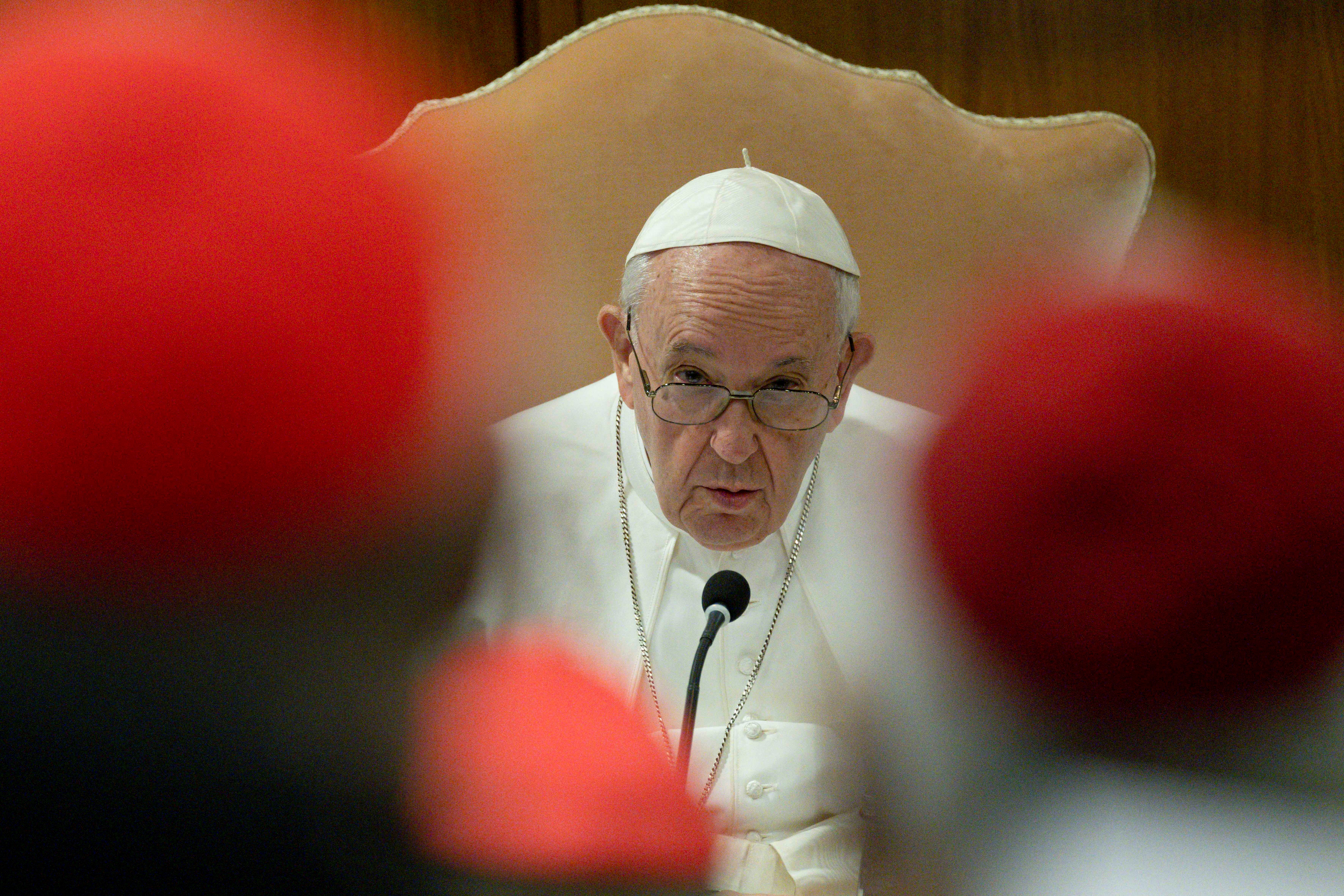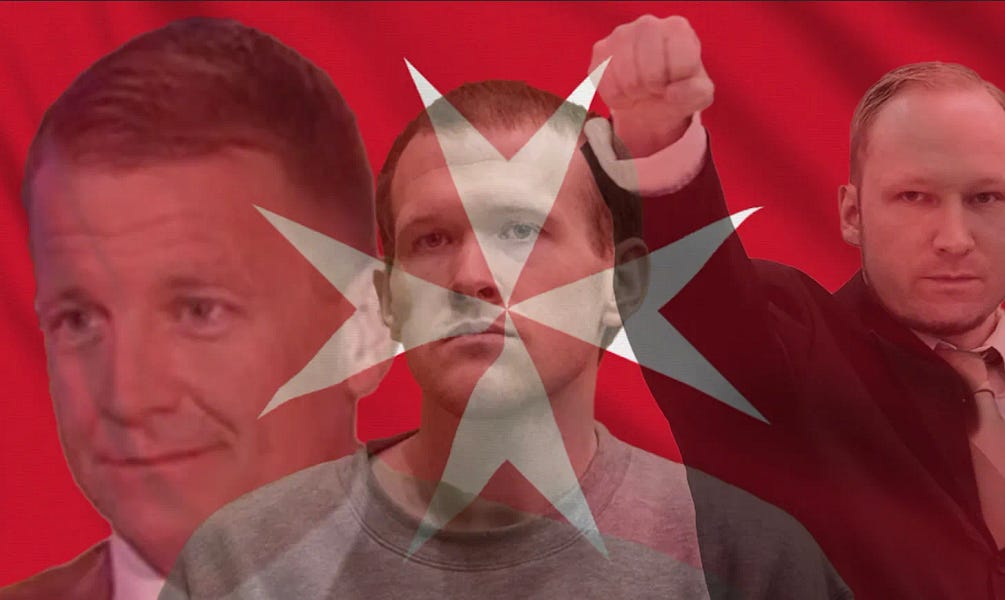

/cloudfront-us-east-2.images.arcpublishing.com/reuters/DHHKJOVOCBKPPHENJPVFB7DG6E.jpg)
Pope dissolves Knights of Malta leadership, issues new constitution
Pope Francis dissolved the leadership of the Knights of Malta, the global Catholic religious order, and installed a provisional government ahead of the election of a new Grand Master.
Pope dissolves Knights of Malta leadership, issues new constitution
Philip PullellaSeptember 3, 20229:00 AM EDTLast Updated 3 days ago
VATICAN CITY, Sept 3 (Reuters) - Pope Francis on Saturday dissolved the leadership of the Knights of Malta, the global Catholic religious order and humanitarian group, and installed a provisional government ahead of the election of a new Grand Master.
The change, which the pope issued in a decree, came after five years of often acrimonious debate within the order and between some top members of the old guard and the Vatican over a new constitution that some feared would weaken its sovereignty.
The group, whose formal name is Sovereign Military Hospitaller Order of St. John of Jerusalem, of Rhodes and of Malta, was founded in Jerusalem nearly 1,000 years ago to provide medical aid for pilgrims in the Holy Land.
It now has a multi-million dollar budget, 13,500 members, 95,000 volunteers and 52,000 medical staff running refugee camps, drug treatment centres, disaster relief programs and clinics around the world.
The order has been very active in helping Ukrainian refugees and war victims.
It has no real territory apart from a palace and offices in Rome and a fort in Malta, but is recognised as a sovereign entity with its own passports and licence plates.
It has diplomatic relations with 110 states and permanent observer status at the United Nations, allowing to act as a neutral party in relief efforts in war zones.
Cardinal Silvano Tomasi, the pope's special delegate to the order, told reporters at a briefing along with some members of the provisional government that the order's new constitution would not weaken its international sovereignty.
But as a religious order, it had to remain under the auspices of the Vatican, said Cardinal Gianfranco Ghirlanda, a member of the working group that prepared the new constitution approved by the pope on Saturday.
Francis convoked an extraordinary general chapter for Jan. 25 to begin the process of electing a new Grand Master.
The last one, Italian Giacomo Dalla Torre, died in April.
"We hope this will re-establish unity in the order and increase its ability to serve the poor and the sick," Tomasi said.
Tomasi and the Lieutenant of the Grand Master, Canadian John Dunlap, will lead the group to the general chapter. A new Grand Master is expected to be elected by March, officials said.
Under the previous constitution, the top Knights and the Grand Master were required to have noble lineage, something reformers said excluded nearly everyone except Europeans from serving in top roles.
The new constitution eliminates the nobility rule as well as the tradition of Grand Masters being elected for life.
"It will be more democratic. The question of nobility has now become secondary," Tomasi said.
Future Grand Masters will be elected for 10-year terms, renewable only once, and will have to step down at age 85.
Reformers, backed by the Vatican, had called for a more transparent government to bring in fresh blood and allow the order to better respond to the massive growth it has seen in recent years.

Pope Francis expands ranks of cardinals in charge of electing new church leader
Pope Francis elevated 20 more churchmen to the rank of cardinal on Saturday, formally expanding those now eligible to vote for his successor in case he dies or resigns — the latter a step he has said…
Pope Francis expands ranks of cardinals in charge of electing new church leader
27/08/2022 - 20:1001:26
Pope Francis and Pope Emeritus Benedict XVI attend a meeting at the Vatican on the day of a consistory ceremony to elevate Roman Catholic prelates to the rank of cardinal, August 27, 2022. © Vatican media via Reuters
Of the churchmen being named new cardinals in the consistory ceremony in St. Peter's Basilica, 16 are younger than 80 and thus eligible to participate in a conclave — the ritual-shrouded, locked-door assembly of cardinals who cast paper ballots to elect a new pontiff.
The 85-year-old Francis has now named 83 of the 132 cardinals currently young enough to join a conclave. The others were appointed by the previous two popes, St. John Paul II and Benedict XVI, whose unexpected retirement in 2013 paved the way for Francis to be elected.
With the eight batches of cardinals Francis has named, prospects are boosted that whoever becomes the next pontiff will share his vision for the future of the church.
Francis reminded the cardinals of their mission, which he said includes “an openness to all peoples, to the horizons of the world, to the peripheries as yet unknown.”
Underlining Francis' attention to those on society's margins, among the new cardinals is Archbishop Anthony Poola of Hyderabad, India. The prelate, 60, is the first member of the Dalit community, considered the lowest rung of India's caste system, to become a cardinal.
One by one, the newest cardinals, whose red cassocks and headgear symbolizes the blood they must be prepared to shed if necessary in their mission, knelt before Francis, who placed on their head the prestigious biretta, as the three-peaked hat is known.
That intimate moment was a chance to exchange a few words with Francis, who smiled to put them at ease. At times, the seated Francis, himself hobbled by mobility problems, lent his own arms to help kneeling cardinals stand up.
In choosing San Diego Bishop Robert Walter McElroy, Francis passed over U.S. churchmen leading traditionally more prestigious dioceses, including San Francisco Archbishop Salvatore Cordileone.
McElroy has been among a minority of American bishops who opposed to a campaign to deny Communion to Catholic politicians who support abortion rights. Cordileone has said he'd no long allow U.S. House Speaker Nancy Pelosi to receive Communion for her defense of abortion rights.
While staunchly against abortion as a grave sin, Francis has also decried what he calls the weaponization of Communion.
McElroy last year was also among a small group of U.S. bishops signing a statement denouncing the bullying that is often directed at LGBTQ youth.
Francis has tried to make gay Catholics feel welcome in the church, whose teaching holds that same-sex intercourse is a sin.
Among the newest cardinals is Bishop Richard Kuuia Baawobr from Wa, Ghana, who has spoken out against LGBTQ rights. The African prelate felt ill when he arrived in Rome on Friday and was hospitalized for a heart problem, the pope told the other cardinals, asking them to pray “for this brother who should have been here.”
Asked by The Associated Press about such contrasting views among church leaders, McElroy replied that “there are always cultural differences within the life of the church as there is within in the human family. And different cultures approach these questions in different ways.”
McElroy added: "My own view is that we have an obligation in the church to make the LGBT persons feel equally welcome in the life of the church, as everyone else.”
With electing future pontiffs a key role for cardinals, McElroy, 68, was asked what he thought of Francis' saying that resignation for popes is a valid option.
“In principle, I think it is a good idea at a particular moment when they feel they can no longer carry the burdens of that office, but I think this pope is far from that moment," the U.S. prelate said. “I believe he sees himself as far from that moment. What he has is a mobility issue, but it has not affected his mind. I can tell you he is still on top of things."
Archbishop Ulrich Steiner of Manaus, Brazil, became the first cardinal from the Amazon, the vast, environmentally-vulnerable region in South America on the Argentine-born pontiff’s home continent. In remarks to The AP, Steiner expressed concern about increasing violence in the Amazon.
"But this violence was not born there, it came from outside,'' Steiner, 71, said. ”It is always violence related to money. Concessions, deforestation, also with the mines, also with the fishing."
At 48, the youngest member among the cardinals' ranks is an Italian missionary in Mongolia, where Catholics number some 1,300. Francis "knows how important it is supporting these little communities,'' said the new cardinal, Giorgio Marengo.
Originally, the pope had picked 21 new cardinals. But retired Belgian Bishop Luc Van Looy declined the honor, citing his own inadequate handling of cases of sexually abusive priests while he led the Ghent diocese from 2004-2020.
(AP)






 shyt would be bonkers if you had 3 Popes that are alive if Francis decides to bounce from the position; 1 Acting Pope and 2 Former Popes.
shyt would be bonkers if you had 3 Popes that are alive if Francis decides to bounce from the position; 1 Acting Pope and 2 Former Popes.